Like a soldier in wartime, Ellie Gray has rapidly ascended the ranks of her profession.
Just 20 years of age, Ellie is already a chef de partie in the Fetterangus kitchen she works in. The role is a critical position that puts her in charge of the lesser-ranked commis chefs and just under the kitchen’s sous chef.
It’s a lot of responsibility, especially considering Ellie is a student still learning her trade at North East Scotland College (Nescol) in Aberdeen.
“It’s a big thing to take on,” she admits. “But I’ve got the most experience in the building, and everyone else was… away.”
By “away”, Ellie means her former colleagues have left the industry, part of an exodus from hospitality that has changed the face of the trade and jumped young chefs quickly up the career ladder.
As the attrition mounts, the casualties are clear.
Staff Wanted signs, already a common sight in the windows of restaurants and cafes across the north and north-east, are giving way to ones that read ‘Business Closed’.
Delivery jobs make ‘more money than standing in a kitchen sweating all day’
The underlying causes for the worker flight include Brexit and the subsequent departure of experienced overseas staff.
Covid exposed the precariousness of many kitchen jobs, and the pandemic increase in online food delivery both squeezed restaurant margins while offering beaten-down chefs a convenient – and higher-paying – escape route.
As Ellie puts it: “Chefs that have been in industry for 10 years are taking delivery jobs that are making them more money than standing in a kitchen sweating all day.”
It is this turbulent environment that Ellie and her fellow students will step into when they leave Nescol at the end of next spring clutching a Level 3 Diploma in Advanced Professional Cookery.
The City & Guilds-recognised qualification has the power to springboard them into a successful career as a professional chef.
But it hasn’t been easy.
The training is rigorous and includes long hours in Nescol’s highly respected on-site kitchen. Built to resemble a fully-functioning professional kitchen – and attached to working restaurant Gate 63 – it provides crucial first-hand experience of cooking in a live environment.
As the students approach the end of their training, their future looks – in some ways – bright. The worker shortage has put their skills at a premium. Kitchen staff have seen wages go up and conditions improve.
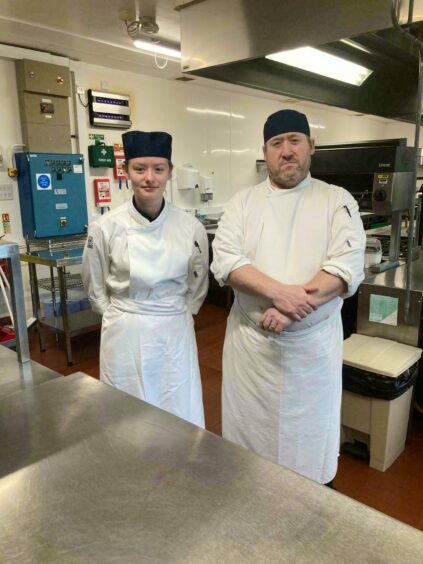
“It’s an employee’s market,” admits trainee Ken Paterson, 50, who has gone back to school after giving up a job as an oil and gas welder.
‘At the time, I didn’t quite understand who this lunatic was’
But speak to this next generation of chefs, and it quickly becomes apparent that few of them are in it for the money.
Yes, the job is tiring.
They will be expected to work long shifts at unsociable hours of the day. And maybe someone will shout at them for getting an order wrong.
But inside each of them is a passion for the trade.
“Yeah, everyone has those days where you just want to go home,” says 19-year-old Adam Hunter, who learned to cook from his mum, though now admits he’s the better chef. “But even at the end of it all I can still say – I love my job.”
Ken tells a story about working as a kitchen porter when he was 18 and watching the head chef walk out the door at the end of each shift with a smile on his face.
“At the time, I didn’t quite understand who this lunatic was,” Ken says. “But having gone through this training, I now do.”
Will the restaurant industry collapse?
Behind the passion is a realistic understanding of the industry they are going into. For some, cooking may be a calling, but it is also a vocation that pays the bills.
Kerry Adam, 27, lives in Inverurie with her eight-year-old daughter.
Before joining the course, she worked a £10-an-hour job in a care home kitchen. Her qualifications will mean she should be able to earn 20% more.
Long-term, her goal is to be an Environmental Health officer, tasked with grading kitchens on their hygiene levels.
“We’ll see how far I get,” she says.
Her fellow students are clear-eyed about the state of their chosen profession. They may love cooking, but the recent struggles of the hospitality industry have not passed them by.
“It’s going downhill,” says Ellie of the restaurant trade. “The industry is going to collapse if it’s not financially taken over.”
Adam sees the damage rising costs have inflicted on restaurants in Aberdeen. A number of outlets have closed over the past few months, brought low by inflation and massive hikes in energy prices.
“Union Street now, there’s just nothing there,” he says. “That’s one thing that’s daunting about the future of hospitality.”
The fight against London brain drain
Indeed, Adam has tentative plans to use his diploma to leave Aberdeenshire and take a job in London. He sees the capital as a testing ground for a young chef – a place to immerse himself in different culinary cultures and styles.
The plan makes sense. But it is bad news for a north-east hospitality sector desperate for dedicated chefs.
“There are more than sufficient jobs in the area, and there are more insufficient interesting jobs in the area,” says Michael Murray.
Michael is the owner of The Dowans Hotel and Restaurant in Aberlour. He bemoans the brain drain of newly-trained local chefs to London.
He argues the north-east has everything a budding chef needs for a meaningful career.
“The types of food challenges that you could face in this area would be as interesting as any other kitchen in any other part of the UK,” he says.
Michael has a vested interest in retaining talent in the north-east as he has felt the impact of staff shortages first-hand. A year on from opening The Dowans’ sister venue – Hotel 1881 in Archiestown – he only has one working chef on site.
In a perfect world, he would employ nine.
Therefore, to feed the local hospitality trade, Michael wants people like Adam to stick around.
He also wants those already working as chefs to show more staying power. The hotel owner has recruited two head chefs to Hotel 1881; the first lasted three days and the second didn’t show at all.
“The last we heard from him was on a Sunday evening saying I’ll see you tomorrow,” Michael recalls.
“If you meet him on the road it would be useful if you could point him to our address.”
A dropout rate to rival the Royal Marines
At Nescol, the trainees say they have the commitment Michael is looking for.
After all, the 16 students on the third-year course are what’s left from a year-one intake of 64. It’s a dropout rate that rivals the Royal Marines.
“We’ve lost a lot of people,” says Ellie, who admits that kitchen work attracts a lot of school leavers that may not have a clear understanding of how hard the job can be. “But we’re still here.”
Meanwhile, the students are aware that no matter how many hours they clock in the Nescol kitchen, life outside of the educational bubble will be different.
“In there, you have the lecturers to make sure my food is right before it’s sent out,” says Adam. “But out in the industry you have to use your own judgement.”
Kerry, on the other hand, is eager to get started.
“I can’t wait to put the skills that we’ve actually learned in place,” she says.
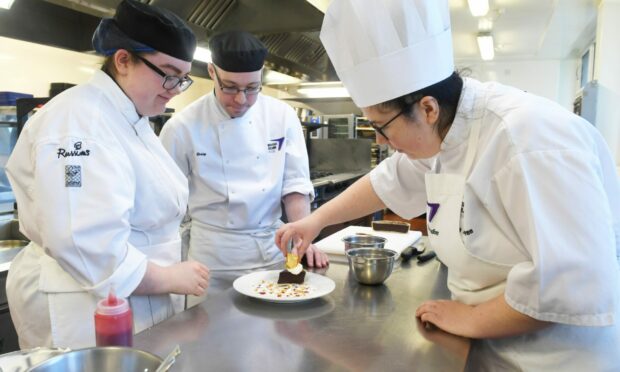

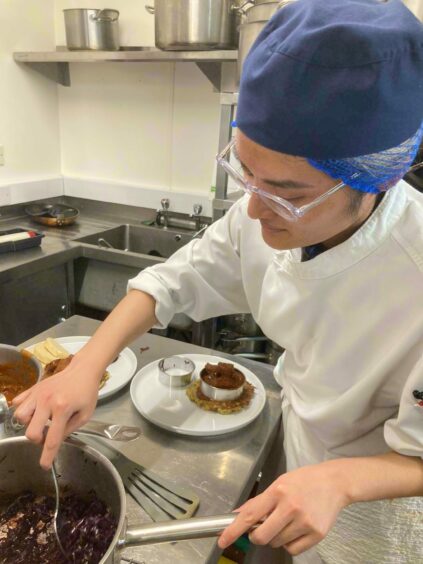
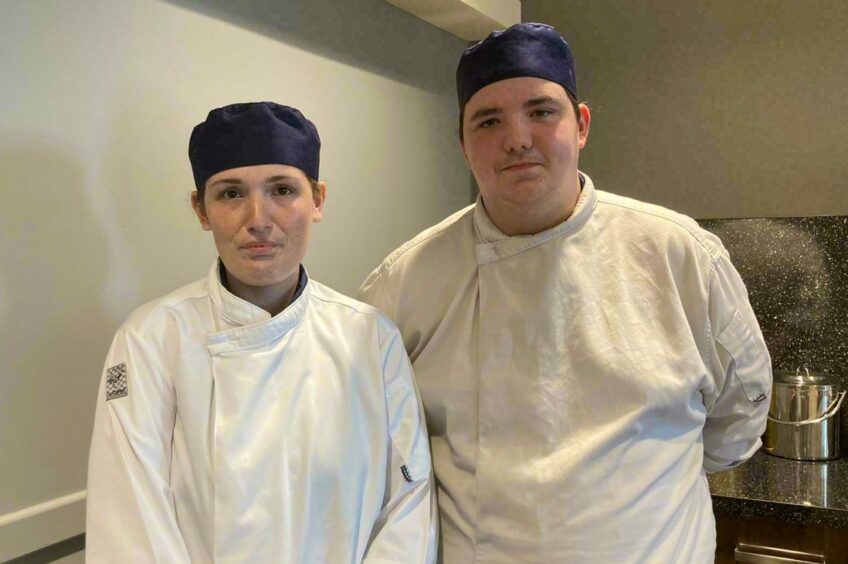
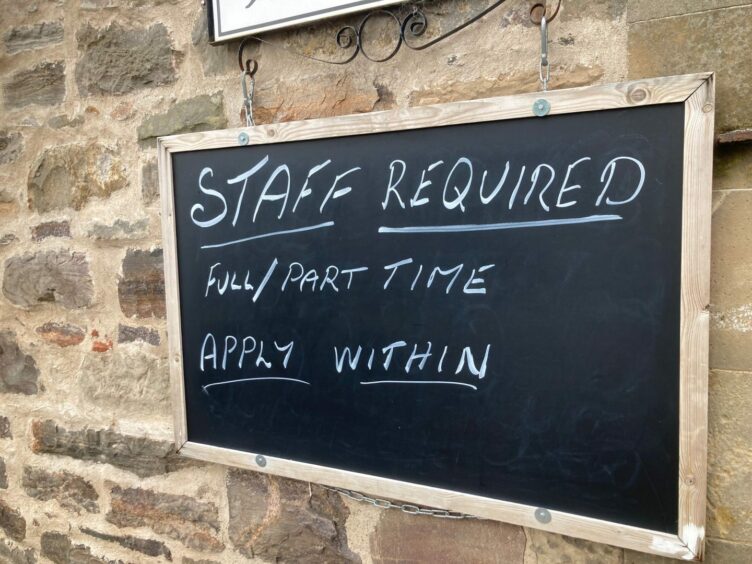
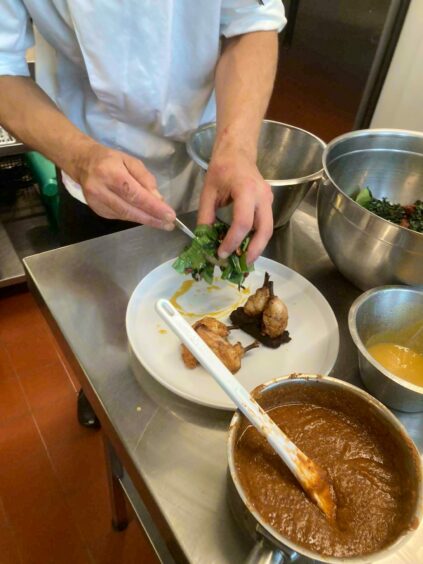
Conversation